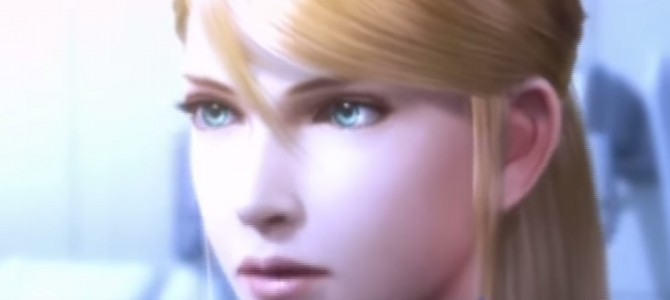
Transgendered game developer Brianna Wu recently caused something of a stir in the gaming community with his transparent attempt to transform his Tumblr headcanon into reality. I speak of his article, “Metroid’s Samus Aran is a Trans-Woman. Deal With It.” It garnered several well-written rebuttals, with two highlights being Brandon Morse at this very site, and a piece by Anthony Lee at Techraptor.
I have no intention of trying to one-up their thorough demolitions of Wu’s factual claim. Rather, I want to delve a bit into the fascinating philosophical biases that Wu, otherwise known as John Flynt, displays in his follow-up article, “Well, That Escalated Quickly: A Samus Followup.”
That post is probably the most blatant piece of nerd baiting since Gawker’s official pronouncement that playing “Magic: The Gathering” makes you undatable. Consider this passage, where Wu rebuts what is probably the most common argument against his claim:
The most harmful, damaging argument by far is that by claiming Samus is a transgender woman, I am somehow taking away her legacy as a strong female character. This, put bluntly, is blatantly transphobic and terrible. Cisgender women do not have a monopoly on the female perspective. Neither do white women or straight women.
Yesterday, Idris Elba was trending because many white people were unable to see him as James Bond. Clearly, if you can’t imagine Bond as a black person, you have unconscious bias against black people. Similarly, if you can’t imagine Samus as a transgender woman, you have unconscious bias against transgender women.
The heading on this section is: “Transgender women are women, period,” but Wu’s actual argument does everything it can to undermine that idea.
Male Genitalia Is Now Considered a Birth Defect
Let’s accept that the heading is correct, and men who choose to undergo surgery to approximate biological femininity actually have been women all along. If that is so, then we face an interesting question: If women are women, regardless of sex assigned at birth (as Wu posits), then the surgical transformation would be a mere formality that brings the body into conformity with the person’s natural state. In other words, according to this line of argument, being born with the wrong set of genitals is essentially a birth defect.
How do we talk about people who have had birth defects corrected by surgery? Well, we don’t speak of people born with extra limbs who’ve had them removed as “trans-two armers.” We don’t speak of people who have cleft palette surgery as “jaw-conforming.” We certainly don’t insist on people who’ve had tumors removed as being “de-tumored persons.”
The reason is fairly obvious: In all of these cases, we recognize precisely what Wu’s heading suggests—that the “birth defect” does not reflect on the person’s essential qualities. So just as a person born with a cleft palette is still a person, even before the palette is fixed, a woman born with superfluous genitals is still a woman even before the genitals are removed. In short: a woman is a woman is a woman, whatever abnormal features she might have had at birth.
But if this is true, then here’s a simple question: Who cares if Samus Aran is specifically a transgendered woman? It’s not like we’re talking about a case like Quasimodo in “The Hunchback of Notre Dame,” or Erik in “The Phantom of the Opera,” where a character’s inborn physical abnormality defines how he or she relates to the world.
In the Metroid universe, Samus passes as a physical woman any time she needs to, and the rest of the universe relates to her as such. If you accept the theory that transgendered women are indistinguishable from women who are born that way, being transgender adds absolutely no content to Samus Aran as a character.
Either Trans Women Are Different Or They Aren’t
I say if you accept that theory because, on the strength of the evidence, Wu clearly does not. Consider his point that “cisgender women do not have a monopoly on the female perspective [and] neither do white women or straight women.”
Right away, you should be able to spot that one of these things is not like the other. True, race can be faked by the likes of Shaun King and Rachel Dolezal, but once exposed, we all know that these people are fakes. Similarly, light-skinned blacks who “pass” as white are universally acknowledged to be biologically black, even if they choose to adopt all the cultural markers of whiteness.
Similarly, sexual orientation seems difficult to fake, and when a person previously thought to be straight “comes out” as gay, the presumption is that they are simply acknowledging biological reality rather than altering it. Put bluntly, being white or straight is immutable, whereas inborn biological sex, according to most trans people, is not.
Furthermore, to get to Wu’s second point about Elba being potentially the first black James Bond, the rationale for a black Bond is far clearer than the rationale for a trans Samus Aran. That is, James Bond is a role model to many, and the reason people care about creating role models for non-white or non-straight people is because those traits are immutable, and might permanently alter one’s perspective on the world in a way they cannot shed. Creating distinctive role models for them is, therefore, a way of acknowledging their common humanity. Cosmetic features, like fashion choices or surgically altered disfigurements, are accorded much less moral weight.
However, most transgendered women don’t seek to be viewed as immutably different from their cisgendered counterparts. Quite the opposite. In fact, if Samus Aran were a real person, Wu’s writing an article “outing” her as born male would probably be seen as extremely unethical, precisely because the transgendered community believes her inborn genitalia are an irrelevance compared with the psychological reality of who she is. Yet Wu wants to be seen as a radically pro-trans writer for outing Samus because it’s a slap against the “monopoly” cisgendered women hold on the female experience.
But if this slap is needed, then in Wu’s world that must mean there is something immutably different about transgendered women. They’re not just cisgendered women born with birth defects that prevent their true gender from being acknowledged. They’re different from cisgendered women in the same way black women are different from white women, or lesbian women are different from straight women. But if there is a difference between “transgendered women” and “cisgendered women” that we’re bound to respect as a moral matter, that seems to destroy the entire philosophical basis for gender revisionism in the first place.
The Point Is to Destroy Womanhood
What immutable characteristic can they claim? True, transwomen and transmen can’t conceive children, but if sterility is an immutable trait of the transgendered, then every man who gets a vasectomy, and every woman who gets her tubes tied, is becoming “trans.” This is obviously absurd, which leaves only the fact of having been born with the wrong genitals. But if this does somehow make you inextricably different from inborn women, then inborn sex organs clearly do matter. A few people I went to college with openly acknowledged this reality, and claimed there were actually five genders: male, female, transwoman, transman, and agender.
But if this “different gender” theory is true, then why pretend to be a woman, to the point of surgically altering yourself to be indistinguishable from one, in the first place? Why not call yourself a crossdresser, or a transsexual, or (heaven forfend), a tomgirl? In fact, isn’t the surgery implicitly a sign of shame in the same way a black person dying his or her skin white would be?
I’ve played dumb thus far, but the reason for Wu’s attempt to use the “cis” and “trans” prefixes as weasel words to claim bigotry is bloody obvious. It is, in fact, an attempt to render the entire idea of womanhood incoherent, so Wu can have his victim cake and eat it, too. Whatever he might say about his detractors, in being so stubbornly insistent that Samus Aran has to be transgendered, it is he who is revealing a failure of imagination.
Imagine a Muslim stating that, even though he had experienced religious persecution, he could not identify with Shylock in “Merchant of Venice” unless Shylock was reinterpreted to be Muslim rather than Jewish. We would recognize this as a bigoted failure of imagination. So, too, is Wu’s inability to see anything identifiable in a cisgendered woman who has also been assumed to be male, simply because she (Samus) had the gall to be born female, rather than made that way by surgical edict. Indeed, Wu’s loathing and resentment for the cisgendered and their “monopoly” comes through loud and clear in both his articles, not least of all in his contemptuous injunction to readers to “deal with” Samus’ alleged transgender status. In fact, a more honest version of his first headline might be: “Metroid’s Samus Aran is our character. Deal with it.”
Let me be quite clear. I have written articles defending the transgendered community in the past, but that was motivated by a belief that the argument that one is transgendered boils down to an acquiescence in the face of a higher natural order—in this case, psychological or neuroscientific reality. If it is, instead, used as Wu is doing—to appropriate not just certain female characters, but to discredit the entire concept of femininity—then I think it deserves no sympathy from anyone.
Metroid’s Samus Aran remains canonically a born woman. She remains a role model for millions of girls. If some people born male happen to identify with her as well, it’s of no concern to me, but that identification must be born from the belief that Samus is a woman, and that they, too, seek to be included as women. Not, as Brianna Wu is, as victim complexes in search of a cause.









